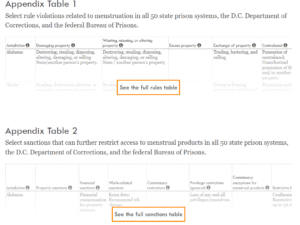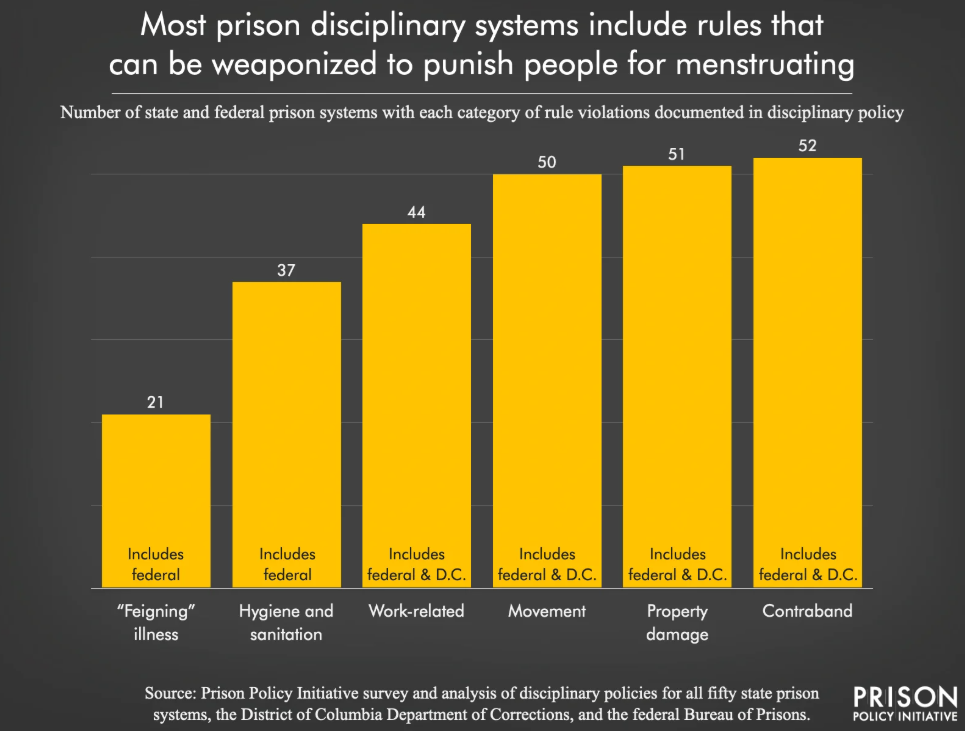Menstruating in Correctional Facilities, Sometimes Ending in Mistreatment, Infractions (or Charges).
PPI review of prison regulations and accounts from incarcerated individuals reveals troubling patterns in how the correctional system punishes people for menstruation. We analyze rules from all states, the District of Columbia, and the federal Bureau of Prisons, showing how many allow unjust penalties for this natural physiological process.
by Miriam Vishniac and Emily Widra, November 12, 2025
In her extensive research on menstruation in prisons, lead author Miriam Vishniac of the Prison Flow Project collected invaluable reports from individuals directly impacted by their experiences of menstruating in prison.
“They were not getting what they needed and then often being ridiculed or punished for not having adequate equipment to take care of their periods…” – A.K. (Vishniac, 2025)
L
Vishniac found that at least six types of rules could be used against people for menstruating:
- Damaging property: Rules to prevent damage to prison property often punish individuals for bleeding on prison-issued items, exceeding their menstrual product limit, or using alternatives like toilet paper or rags.
- Maintaining personal hygiene: Rules requiring tidiness can disadvantage menstruating individuals who lack adequate menstrual products and extra clothing.
- Contraband: Rules limiting the type and amount of property in cells can turn basic hygiene products into prohibited items.
- Movement: Prison movement rules restrict access to bathrooms, showers, and laundry for menstruating individuals.
- Work assignments: Rules mandating work participation or penalizing unauthorized absences unfairly disadvantage those menstruating who may struggle with job performance.
- “Feigning” illness: Rules supposedly designed to reduce the unnecessary and expensive use of healthcare resources undoubtedly result in the dismissal of real, severe symptoms experienced in menstruation.
Disciplinary policies in prisons outline punishments for rule violations, typically using a similar framework across systems. Common sanctions include restricted access to privileges such as phone calls, visitation, recreation, and commissary for a set period. For analysis, we categorized these sanctions; refer to Appendix Table 2 for details on each state’s system. See Appendix Table 2, BELOW, for our categorizations for each state.

Combined with officer discretion, the general lack of oversight in prisons means even the most basic rules can be weaponized.
Property
The strict rules governing property provide an additional method for controlling possession, damage, and misuse.
Wasting state property. Poor quality menstrual products are typical in prisons and result in people needing to use more pads and tampons.
Misusing or altering state property. Incarcerated people often cope by finding ways to meet their own needs, including using makeshift materials as menstrual products.
People in prison lack sufficient access to menstrual products and often can’t proactively wear pads or tampons before their menses start.
Punishing people for menstruating is cruel and unnecessary, harming their self-esteem and mental well-being, with serious consequences in prison and after release.


